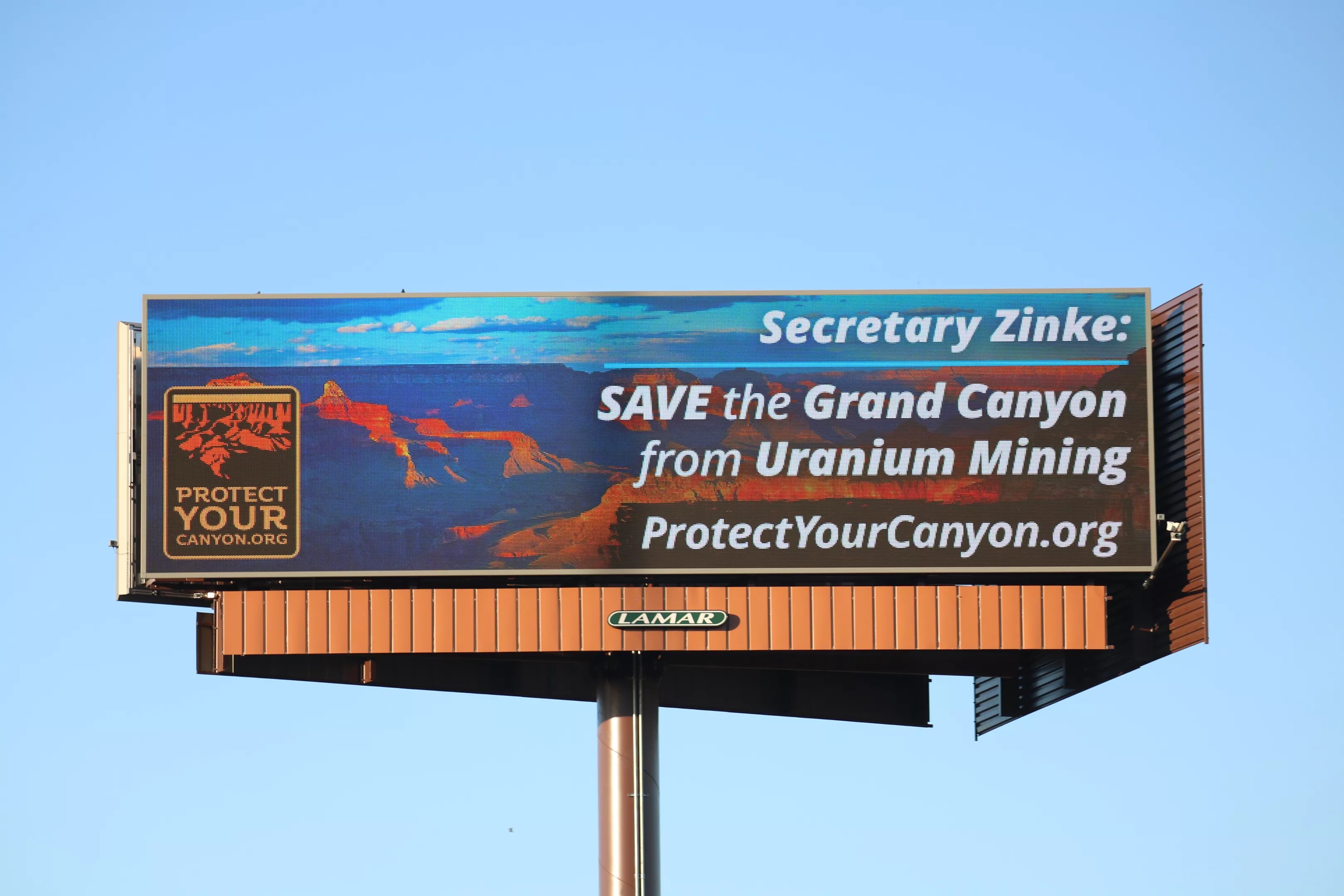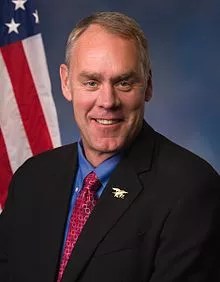
Protect Your Canyon

Audio By Carbonatix
Arizona sporting groups are targeting Secretary of the Interior Ryan Zinke in a publicity campaign to head off a possible rollback of an Obama-era ban on new mining claims around the Grand Canyon.
On Monday, the Arizona Wildlife Federation and Trout Unlimited unveiled two Phoenix billboards that call on Zinke to save Grand Canyon from uranium mining, citing the industry’s hazards for water and wildlife.
The Trump administration has signaled that it may revisit the Interior Department’s 2012 moratorium on new mining claims, known as a mineral withdrawal, that protects over 1 million acres of public lands for 20 years. (Existing mining claims were not affected.)
Ending the moratorium “just doesn’t pass the common-sense test,” said Scott Garlid, the conservation director for the AWF.
“You look at the benefits of mining for uranium up in that area, and they’re relatively small,” he said. “There’s going to be a few additional jobs, but not very many, and certainly not as many as the outdoor and recreation industries … We’re not making America great again by doing uranium mining around the Grand Canyon.”
Because much of the hydrology of the Grand Canyon region is unknown, Garlid argued that it’s not hard to imagine a scenario where a uranium mining incident could contaminate water sources for the nearby Havasupai Tribe and other communities along the Grand Canyon watershed.

Interior Secretary Ryan Zinke
The billboards went up on Monday along Phoenix highways. One billboard is off Interstate 10 and East Van Buren Street, and the other is near Interstate 17 and Pinnacle Peak Road. Trout Unlimited is paying $2,000 for each billboard per month, according to Brad Powell, the organization’s Southwest regional director. The signs will stay up for at least two months, he said.
Powell also serves as the president of the AWF. He believes that at the moment, Arizonans don’t realize the threat renewed uranium mining poses to Grand Canyon.
“We just think this is the wrong place; it’s the wrong time,” Powell said. “Some places are simply too precious to mine, and this is one of them.”
In an email, Zinke spokesperson Faith Vander Voort criticized the billboard campaign.
“We are disappointed to see such a tremendous waste of precious conservation dollars,” Vander Voort wrote. “The Secretary has no intention to revisit uranium mining in and around the canyon and has made exactly zero moves to suggest otherwise.”
Nevertheless, the Trump administration seems ready to re-evaluate the 2012 mining ban, and the president’s allies in Congress are eager to scrap it entirely.
In a report last November, the U.S. Forest Service recommended revising the 2012 moratorium in response to a presidential executive order directing government agencies to maximize natural resource extraction in their jurisdiction. And just last month, Arizona Congressman Paul Gosar, the leader of the Congressional Western Caucus, penned a letter asking the Trump administration to review and reverse Obama-era mineral withdrawals.
Gosar’s letter featured Steve Trussell, the executive director of the Arizona Mining Association, and other mining advocates. Without mentioning the Grand Canyon by name, Trussell argued that the U.S. should start to plumb rich deposits of uranium mining in northern Arizona.
“Responsible domestic uranium mining followed by reclamation will provide great benefits for our country’s electric power needs, local economies and the environment,” Trussell said in the statement. “America’s nuclear power plants are clean and release no carbon emissions, making these deposits in northern Arizona an almost perfect remedy for our electricity-dependent nation.”
The U.S. Ninth Circuit Court of Appeals in San Francisco upheld the moratorium in December in the face of a challenge from the National Mining Association.
Around a dozen sporting groups, including the Arizona Elk Society, the Arizona Flycasters Club, and the Montana-based Backcountry Hunters and Anglers have signed on to the new effort.
Garlid said that because the Trump administration seems unwilling to listen to environmental groups, hunters and anglers are in a unique position. Sporting groups have a more conservative membership, so they may be able to bend the administration’s ear in a way that environmental advocates can’t.
“We want to make sure that our voices are heard on this issue and it’s not just seen as a far-left, green issue,” Garlid said.
The AWF has created a new website urging visitors to sign a petition asking Zinke to protect the Grand Canyon uranium mining moratorium. Garlid said that they have so far collected around 4,000 signatures on paper.
Uranium mining that took place during the Cold War nuclear arms race has wracked the Navajo Nation. Ever since the reckless drive to obtain uranium, tribal communities have suffered the industry’s toxic fallout in the form of radiation exposure and groundwater pollution.
According to the Environmental Protection Agency, there are over 500 abandoned uranium mines on the Navajo Nation. The agency has entered into enforcement agreements and settlements worth $1.7 billion in order to fund cleanup efforts, but environmentalists say the total extent of remediation could cost billions more.
Examining this ugly history, Powell said, should make the decision to maintain the moratorium an easy one for Zinke.
“It would be a tragic legacy to repeat it again and leave another legacy of cleanup,” Powell said.